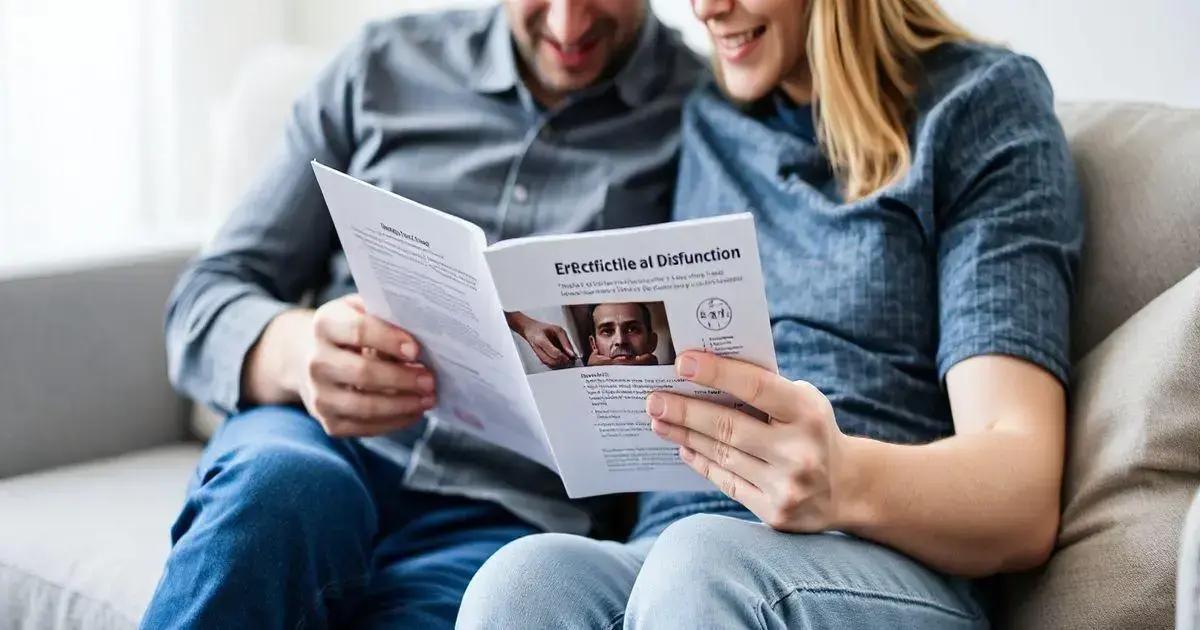Erectile dysfunction can significantly affect intimacy in relationships, but couples can navigate this challenge through open communication, building emotional connections, and seeking professional help together. Practical tips include focusing on non-physical forms of intimacy and approaches to strengthen the bond, ensuring a fulfilling and supportive partnership despite the difficulties posed by ED.
Erectile dysfunction (ED) can significantly impact intimacy in a relationship. Many couples experience challenges as they navigate the emotional and physical aspects of ED. It’s vital to foster open communication, mutual understanding, and emotional support to strengthen the bond between partners. In this blog post, we will explore effective strategies for couples dealing with erectile dysfunction and offer practical tips for enhancing intimacy while facing these challenges together.
Understanding Erectile Dysfunction

Understanding Erectile Dysfunction (ED) is essential for couples facing intimacy challenges. ED is the inability to achieve or maintain an erection sufficient for sexual intercourse. It is often a sensitive topic that can affect self-esteem and emotional connection.
Common Causes of ED
ED can stem from various factors, including physical and psychological issues. Physical causes include:
- Cardiovascular diseases
- Diabetes
- Obesity
- High blood pressure
- Hormonal imbalances
Psychological factors also play a significant role, such as:
- Stress
- Anxiety
- Depression
- Relationship problems
Understanding these causes can help couples address the issue together and seek solutions that strengthen their bond.
Common Myths about ED
There are many misconceptions about ED. Some believe that it’s only a problem for older men, but it can affect younger men as well. It’s also thought that ED signifies a lack of attraction or love, which is untrue. Open discussions about these myths can ease the tension and promote a supportive environment.
Being informed about the nature of ED can help couples navigate intimacy challenges while reinforcing emotional connections. By understanding the condition, partners can work together to seek help and explore alternatives that strengthen their relationship.
Ways to Communicate About ED

Ways to Communicate About ED are crucial for couples dealing with this sensitive issue. Open and honest dialogue can help both partners feel supported and understood. Here are some effective strategies for communication:
1. Choose the Right Time and Place
Begin conversations when both partners feel relaxed and have privacy. Avoid discussing ED during intimate moments, as this can increase stress and discomfort.
2. Use Gentle, Supportive Language
Approach the topic with care. Use “I” statements to express feelings, such as “I feel concerned about our intimacy”. This helps create a non-threatening atmosphere for discussion.
3. Be Honest About Feelings
Share your feelings regarding the situation, whether it’s frustration, confusion, or sadness. Being open about emotions encourages the other partner to share their feelings as well.
4. Listen Actively
Make sure to listen as much as talk. Show empathy and understanding when your partner expresses their thoughts. Avoid interrupting or dismissing their feelings.
5. Explore Solutions Together
After discussing feelings, work together to find solutions for dealing with ED. This might include exploring medical options or looking for alternative ways to connect intimately.
Through open communication, couples can strengthen their relationship, create a supportive environment, and overcome the challenges that erectile dysfunction can bring.
Building Intimacy Beyond Physical Connection

Building Intimacy Beyond Physical Connection is essential for couples facing erectile dysfunction (ED). Intimacy can take many forms, and it is important to explore all of them. Here are some ways to deepen your bond without relying solely on physical intimacy:
1. Emotional Connection
Focus on sharing thoughts and feelings. Engage in meaningful conversations that help both partners understand each other’s emotional needs. This can strengthen your relationship and create a sense of closeness.
2. Spend Quality Time Together
Engaging in activities that both partners enjoy helps foster intimacy. This can include going for walks, cooking together, or having cozy movie nights at home. The goal is to create shared experiences that reinforce your connection.
3. Physical Affection
Intimacy isn’t limited to sexual activity. Holding hands, cuddling, and hugging can enhance feelings of closeness and love. These simple gestures remind each other of your affection and help maintain a strong connection.
4. Explore New Forms of Intimacy
Consider other intimate experiences that aren’t sexually focused, such as couples’ massages or dancing together. Exploring new ways to connect can reinvigorate your relationship and help you both feel closer.
5. Engage in Mutual Support
Support each other emotionally. Be open about worries and concerns regarding ED, and encourage each other to seek help when necessary. Knowing you’re both in it together can create a strong foundation for your intimacy.
Creating intimacy beyond physical connection involves understanding, patience, and effort from both partners. It is key to navigating the challenges of erectile dysfunction together and maintaining a fulfilling relationship.
Practical Tips for Couples Facing ED

Practical Tips for Couples Facing ED can significantly improve both partners’ experiences as they navigate this challenging issue. Here are some actionable strategies to consider:
1. Prioritize Open Communication
Discuss ED openly without judgment. Encourage each other to share concerns and feelings. This helps in building trust and understanding between partners.
2. Focus on Intimacy Without Pressure
Shift the focus from sexual performance to creating intimate moments. Engage in activities that promote closeness, like cuddling, kissing, or giving massages.
3. Seek Medical Advice Together
Schedule a visit to a healthcare provider to explore medical options for ED. Attending appointments together can help both partners feel involved and informed in the process.
4. Educate Yourselves
Read about ED from reliable sources. Understanding the condition better can reduce anxiety and help you support each other more effectively.
5. Engage in Lifestyle Changes
Adopt healthier habits together. This can include exercising regularly, maintaining a balanced diet, and managing stress, all of which can contribute positively to sexual health.
6. Experiment with New Ways to Connect
Explore different forms of intimacy, such as trying new activities together or setting up date nights. Reinventing your routine can keep the spark alive and foster deeper connections.
By implementing these practical tips, couples can navigate the complexities of erectile dysfunction while strengthening their relationship and intimacy.
Seeking Professional Help Together

Seeking Professional Help Together can be a vital step for couples dealing with erectile dysfunction (ED). Working with a professional can provide support and guidance in navigating this challenge. Here are some guidelines on how to approach seeking help together:
1. Choose the Right Professionals
Consider consulting both a doctor and a therapist. A healthcare provider can evaluate physical causes of ED, while a therapist can help with emotional and relational aspects.
2. Schedule Appointments Together
Make a joint decision to attend appointments. This shows commitment to addressing the issue as a team and helps both partners feel included in the process.
3. Prepare for Appointments
Gather questions and discuss any concerns you both want to address with the professional. Sharing your thoughts and experiences during the session can help the provider understand your situation better.
4. Be Open During Consultations
Approach the consultations with honesty. Discuss how ED impacts both partners, including emotional and relational factors. This information is important for receiving appropriate advice and treatment.
5. Follow Through with Recommendations
If the professional offers recommendations or treatment options, make a plan together to implement these suggestions. Commit to attending follow-up appointments and keeping each other informed about progress.
6. Consider Couples Therapy
In addition to discussing medical concerns, consider couples therapy to improve communication and intimacy in your relationship. A therapist can provide strategies to enhance your emotional connection.
Seeking professional help together is a proactive step that can strengthen your relationship and improve intimacy while addressing erectile dysfunction.
In Summary: Nurturing Intimacy Through Challenges
Erectile dysfunction can present unique challenges for couples, but it doesn’t have to define the relationship. By emphasizing open communication and emotional connection, couples can build a stronger bond beyond physical intimacy.
Implementing practical tips, seeking professional help together, and exploring new ways to connect can significantly enhance intimacy. It’s essential to remember that addressing ED is a shared journey that requires understanding, patience, and commitment from both partners.
Facing these challenges together can ultimately lead to a healthier, more fulfilling relationship, proving that intimacy goes far beyond physical forms of connection.
FAQ – Frequently Asked Questions about Erectile Dysfunction and Intimacy
What is erectile dysfunction (ED)?
Erectile dysfunction (ED) is the inability to achieve or maintain an erection for sexual intercourse. It can be caused by physical or psychological factors.
How can couples communicate effectively about ED?
Choosing the right time to talk, using gentle language, and actively listening are key ways couples can discuss ED openly and honestly.
What are some ways to build intimacy beyond physical connection?
Couples can explore emotional closeness through meaningful conversations, physical affection like hugging, and shared activities that promote bonding.
Why is seeking professional help important?
Professional help can provide guidance on both medical and emotional aspects of ED, helping to address the issue comprehensively and strengthen the relationship.
What practical tips can couples use to navigate ED?
Prioritize open communication, focus on intimacy without pressure, seek medical advice together, and explore new forms of intimacy.
Can therapy help couples dealing with ED?
Yes, therapy can improve communication, intimacy, and overall relationship satisfaction, providing couples with the tools to navigate challenges together.












